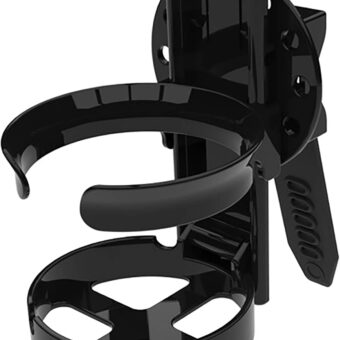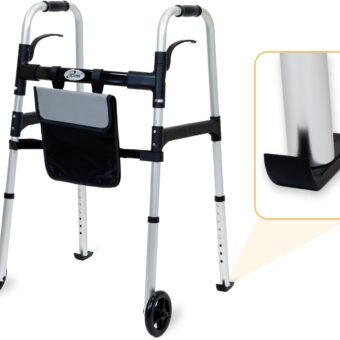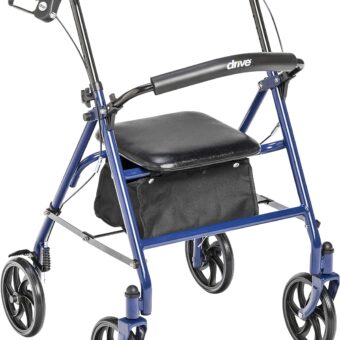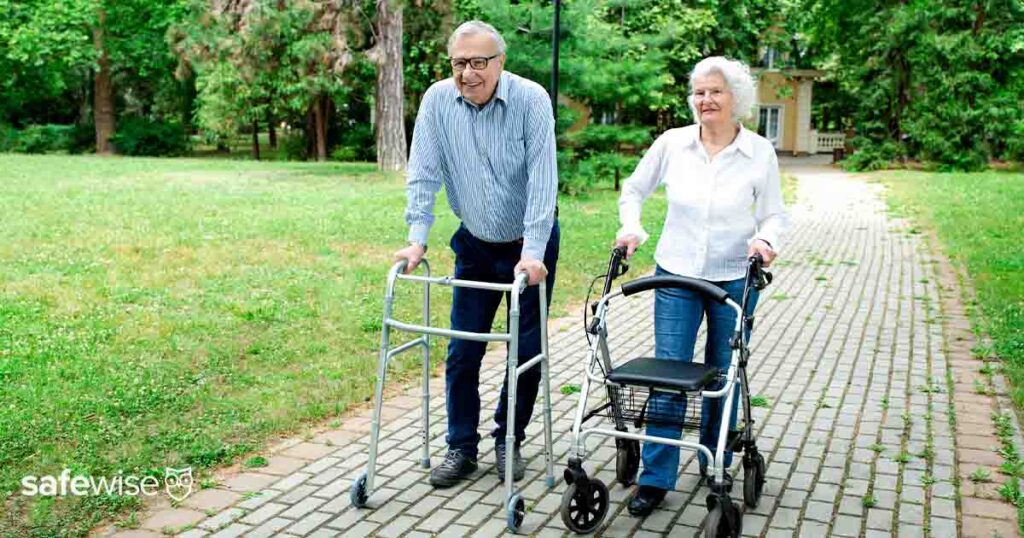
Unlocking Mobility and Independence: The Impact of Choosing the Right Walker for Seniors
The significance of choosing the best walkers for seniors cannot be overstated. These mobility aids offer more than just physical support; they open doors to a world of independence and activity. Imagine the freedom of being able to step outside, engage in enjoyable activities, and embrace life’s adventures, rather than feeling confined to a chair at home. When used correctly, walkers not only enhance mobility but also contribute to reducing the risk of falls, ensuring seniors can navigate their surroundings safely.
Moreover, it’s fascinating to note the growing trend among older adults who are opting for walkers to maintain their active lifestyles while staying safe. A study published in the Journal of the American Geriatrics Society highlighted a significant 50 percent increase in the use of mobility aids among Americans aged 65 and above between 2004 and 2012. This statistic underscores the importance and relevance of walkers in today’s aging population, with approximately 12 percent of seniors benefiting from these aids.
Walkers are available in a diverse array of sizes and styles, catering to various needs and preferences. However, selecting the right model is paramount to ensure optimal support and functionality. Merely borrowing a walker from a friend or family member may not suffice, as each individual’s requirements differ. Consulting with an occupational or physical therapist can provide valuable guidance on determining the most suitable walker for your specific needs.
In this article, we delve into the world of walkers, exploring the different types available and weighing the pros and cons of each. Whether you’re seeking minimal support or comprehensive assistance, understanding the factors to consider when shopping for a walker is crucial. Additionally, we present a curated selection of nearly two dozen of the best walkers for seniors, tailored to address various levels of support and mobility requirements.
- 3 main types of walkers
- Choosing the Perfect Walker: A Comprehensive Guide
- 8 of the best standard and front-wheeled walkers for elderly people
- 9 of the best rollator walkers for seniors
- 3 of the best knee walkers (for special situations)
3 Main Types of Walkers
For seniors seeking a supportive aid to enhance mobility without relying entirely on a wheelchair, medical walkers offer invaluable assistance in maintaining balance and stability. Navigating the array of options available involves familiarizing oneself with the distinct types. Broadly categorized, these walkers comprise standard walkers, front-wheeled walkers, and rollator walkers.
1. Standard walkers
A standard walker is a basic support device consisting of a simple frame with four rubber-tipped legs. Typically crafted from lightweight aluminum, these walkers provide stable support for individuals who need assistance with mobility. They are particularly beneficial for those prone to falls or unable to bear weight on a leg due to injury. Despite offering steady support, standard walkers have limitations. They facilitate slower movement and are not suitable for navigating uneven surfaces. Additionally, individuals lacking upper body strength may find them challenging to use effectively.
Interestingly, some walkers are designed to assist with navigating stairs. By turning the walker sideways and gripping the handle with one hand while using the other hand on the stair railing, individuals can ascend or descend stairs safely. It’s crucial to remember to lead with the stronger leg when going up and the weaker leg when going down, ensuring stability and balance throughout the movement.
2. Front-wheeled walkers
A front-wheeled walker is similar to a standard walker, but it features non-swiveling wheels attached to the front legs. These wheels facilitate easier navigation over uneven terrain. Unlike traditional walkers that require lifting, front-wheeled walkers are meant to be pushed forward, reducing strain on the upper body. However, they offer less stability compared to standard walkers. Certain models come with removable wheels, offering the flexibility to convert them into standard walkers when needed.
3. Rollator walkers
A rollator, often referred to as a “rolling walker,” represents a modern twist on the traditional walker. Featuring either three or four wheels and hand-operated brakes, rollators offer enhanced maneuverability and convenience. Unlike standard walkers, all legs on a rollator are equipped with wheels, with some swiveling to facilitate smoother turns.
Rollators cater to individuals with moderate balance capabilities who require minimal support. They are designed with practicality in mind, often incorporating features like a storage basket or pouch for carrying essentials. Furthermore, models equipped with four wheels typically feature a built-in seat, providing users with the option to rest when needed.
One of the significant advantages of rollators is their versatility. While primarily suitable for outdoor use, they are equally functional indoors, offering users the freedom to move around various environments with ease. However, it’s worth noting that rollators tend to be heavier than traditional walkers, which can pose challenges when folding them for transportation in a vehicle.
In essence, rollators represent a contemporary solution for individuals seeking enhanced mobility and independence. With their combination of practical features and maneuverability, they have become a popular choice for those requiring light support during daily activities.
Choosing the Perfect Walker: A Comprehensive Guide
Finding the right walker can significantly improve mobility and independence for seniors. With various models and features available, selecting the best fit for your needs is essential. Let’s delve into the key considerations when choosing a walker:
1. Width: Walkers come in different widths, so it’s crucial to ensure it fits through doorways and maneuver comfortably in your living space. Measure the width of your home’s doors to determine the appropriate size. Additionally, ensure there’s sufficient space between the handles for comfortable usage.
2. Weight: Consider the weight of the walker, especially if you’ll need to lift it frequently. Opt for a model that’s lightweight yet sturdy to support your mobility needs without causing strain.
3. Handle Height: Adjustable handle height is essential for maintaining proper posture and comfort. Measure the distance from your wrist crease to the floor to determine the ideal handle height. Look for a walker that allows flexibility in height adjustment to accommodate various shoe heights and floor surfaces.
4. Seat Height: For rollators with built-in seats, ensure the seat height aligns with your comfort level. Measure the height of a chair you find easy to use for reference. Some models offer adjustable seat heights for added convenience.
5. Brake Type: Choose a brake system that suits your dexterity and mobility. Loop brakes are standard in rollators, but if you have hand mobility issues, consider weight-activated brakes for ease of use.
6. Capacity: Check the weight capacity of the walker to ensure it can safely support your weight. Most models accommodate up to 250-300 pounds, but some are designed for higher capacities if needed.
7. Foldability: If storage and transport are concerns, opt for a walker that folds easily to a manageable size. Consider models with user-friendly folding mechanisms, especially if you’ll be frequently storing it in tight spaces or transporting it in vehicles.
8. Price: Walker prices vary depending on the type and features. Standard walkers are typically more affordable, while rollators tend to be pricier due to additional features. Remember that Medicare Part B covers walkers deemed medically necessary by healthcare providers, but purchase from approved suppliers to ensure coverage.
In conclusion, selecting the right walker involves considering factors such as size, weight, adjustability, and price. By carefully assessing your needs and preferences, you can find a walker that enhances mobility and promotes independence for seniors.
8 of the Best Standard and Front-Wheeled Walkers for Elderly People
If you’re looking for an economical way to get the extra assistance you need to move around independently, check out this list of the best walkers for elderly people:
1. Able Life Space Saver Walker
The Able Life Space Saver Walker is a standout among narrow walkers for seniors. It can hold up to 400 pounds but is extremely lightweight and folds down to about the size of a large umbrella. Its slim profile allows it to fit through tight passageways, making it an ideal mobility aid for travel. Plus, the front stationary wheels can be replaced with swivel wheels for maximum maneuverability.

2. Lumex UpRise Onyx Folding Walker
Thanks to its two levels of handles, the Lumex UpRise can provide assistance not only with walking, but also with going from sitting to standing. That means it can even be used as a portable aid for getting on and off the toilet. This standard walker is lightweight enough for everyday use and can be folded down with the touch of a single button.

3. Drive Medical Folding Walker
Lightweight yet stable, the Drive Medical Folding Walker folds to half the size of most walkers for easy transport. It is adjustable for a range of heights and can support up to 300 pounds. The textured handles provide a nonslip grip and help reduce hand soreness. And the two detachable pouches make it easy to carry small items around with you.

4. Medline Heavy Duty Bariatric Folding Walker
This model is an excellent walker for seniors who carry extra weight. Durable and sturdy, it can hold up to 600 pounds and comes with padded hand grips for comfort. Plus, the rubber caps on the back legs can be replaced with skis and felt pads (not included) to help the walker glide smoothly without scratching your floors

5. Medline Heavy Duty Bariatric Walker
With an extra-wide frame, handles that adjust from 33.5 inches to 43.5 inches high, and a weight capacity of 500 pounds, this two-wheeled walker offers comfortable support for larger adults. It even folds flat, so it can easily be tucked under a bed or into a trunk. However, as is the case with most oversized walkers, this one may not fit through all doorways.

6. Stander EZ Fold-N-Go Walker
Looking for a two-wheeled walker that is portable and easy to store? Check out this compact model from Stander. It supports users of up to 400 pounds, but it folds down to 4 times smaller than most other models. The base is only 24 inches wide, and when folded its footprint only measures 5 by 7 inches. This walker also comes equipped with a nylon pouch to carry around small items.

7. Goplus Foldable Standard Walker
Adjustable down to a 30-inch height, this sturdy walker is a good choice for shorter seniors. This walker can fold down very compactly, making it well-suited for travel. Also, the rubber tips on the back legs can be switched out for glider caps to help the walker move more smoothly over varied terrain.

8. Healthline Trading Folding Junior Walker
Are you on the petite side? This height-adjustable junior walker is aimed at people under 5’4″ and has a total weight capacity of 250 pounds. It is lightweight and folds easily, so transferring it in and out of cars is a breeze. The wheels can be attached to the inside of the legs if you want to make it even easier to get through narrow doorways.

9 of the Best Rollator Walkers for Seniors
Also called rolling walkers or just rollators, these wheeled devices can be good mobility aids for people who need more support than is offered by a cane and don’t like the slow pace of a traditional walker.
Rollators come with either three or four wheels. Triangular-shaped three-wheeled models have a tighter turning radius and are easier to maneuver, but four-wheeled models come with seats and provide more stability. If you find that you need to take periodic rest breaks while you’re out and about, you will probably want a model with a seat.
For help with your choice, have a look at our top 10 picks for the best rollator walkers for seniors (with seats and without):
1. Invacare Bariatric Rollator
The Invacare Bariatric Rollator is a heavy-duty rollator featuring a sturdy steel-reinforced frame to support individuals who weigh up to 500 pounds. The padded seat is extra wide, the backrest can easily be removed to create additional space, and the adjustable handlebars can accommodate seniors as tall as 6’5″.

2. Vive Folding Rollator Walker
The Vive Folding Rollator Walker ranks among the most popular four-wheeled walkers for seniors. It rolls smoothly, has a comfortable seat and backrest, and comes with both a storage bag and cane holder. It also folds down easily and compactly, and the front wheels can be removed to make it fit into even smaller spaces.

3. NOVA Zoom Rollator Walker
Uniquely among rolling walkers, the NOVA Zoom comes in four different seat heights, so you can get just the right fit. Plus, the handles are height-adjustable, so this walker can suit seniors as short as 4’10” and as tall as 6’2″. It features a padded seat that’s easy to clean and an under-seat pouch to store your belongings. It also locks when folded to make it easier to tuck into a closet or trunk.

4. Hugo Mobility Elite Rollator Walker
Hugo’s rollator walker features adjustable handlebars as well as a padded seat that can be set at two different heights. With storage both under the seat and in an additional saddle bag, there’s plenty of room for all your essential items. Plus, the rollator conveniently folds down to fit into vehicle trunks.

5. ProBasics Transport Rollator Walker
With its padded seat, push bar, and fold-down footrests, this four-wheeled rollator can be used as both a walker and lightweight wheelchair. The handles can be adjusted for a range of heights, the brakes are easy to use, and the wire basket under the seat provides a handy way to carry whatever you need.

6. NOVA Traveler 3-Wheel Walker
With the removable basket, pouch, and tray, the NOVA Traveler offers plenty of convenient ways for you to carry everything you need. The durable rubber wheels provide stability over many types of terrain, and the brakes are designed for comfortable use even by adults with poor hand strength. This three-wheeled walker can even stand on its own when folded.

7. Lumex Set n’ Go Adjustable Rollator
Like the Medline Freedom, the Lumex Set n’ Go lets you adjust the height of both the seat and the handlebars to ensure a comfortable fit. This model is slightly heavier than the Freedom, but this one can support up to 300 pounds. The large basket provides convenient storage, and when you flip up the seat, you find an additional zippered pocket for keys, cell phones, or other small items. The Set n’ Go is available in four different colors.

8. Medline Freedom Ultralight Rollator
Weighing in at just under 13 pounds, this is one of the lightest four-wheeled rollators on the market. It also stands out for the fact that both the seat and the handlebars can be adjusted for a wide range of different heights. It provides stable support for users who weigh up to 250 pounds, and it folds down almost flat for travel or storage. You have a choice of three colors.

9. Drive Medical Rollator
This well-reviewed rollator offers stability and affordability. Its seat and handlebars are both height-adjustable, it can hold adults up to 300 pounds, and its frame is light enough that you shouldn’t have to strain to lift it in and out of cars. The under-seat storage pouch doesn’t even have to be removed for folding. You can choose a red or blue model.

3 of the Best Knee Walkers (for Special Situations)
If you have an injured foot or ankle and cannot place any weight on it for a period of time, a knee walker might be a good mobility aid for you. A knee walker is a wheeled scooter that is often used as an alternative to crutches. It lets you move about quickly and easily by leaning one knee on the walker while using your good leg to propel yourself.
Here are a few of the best knee walkers for seniors:
1. All Terrain KneeRover Knee Scooter
This may be the best walker for seniors who have lower leg injuries but still want to explore the outdoors. The 12-inch air-filled tires can easily handle all types of terrain (including gravel and sand), and the adjustable knee rest is made of contoured foam for comfort. Durable and rugged, this scooter can hold up to 350 pounds and is height-adjustable for adults up to 6’6″. It also comes with a detachable storage basket. However, it’s not suitable for seniors under 5’6″.

2. KneeRover Deluxe Knee Walker
A less expensive alternative to the All-Terrain KneeRover, this deluxe model is designed for individuals between 4’9″ and 6’6″ who weigh up to 300 pounds. It features the same cushioned knee rest and detachable storage basket, but this model has 7.5-inch rubber tires rather than 12. Still, it provides a smooth ride both indoors and outdoors.

3. ELENKER Knee Walker
The knee rest of this scooter is contoured with padded ridges to cushion your knee and help keep it stable as you move. Both the knee rest and the handlebars are fully adjustable, though this model was not meant for petite seniors. This walker also comes with a large attached basket, so you can carry all of your essentials with you.
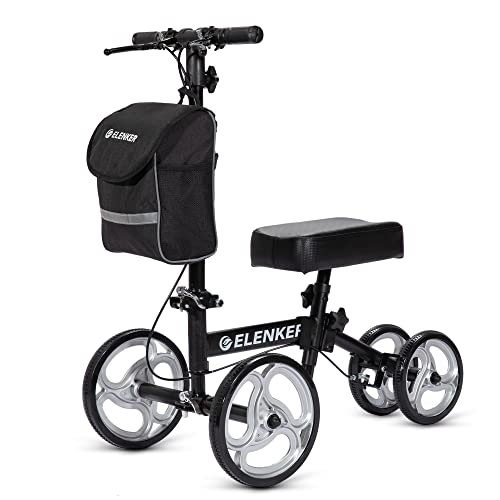
Get the Support You Need
Maintaining your mobility is a big part of remaining independent, and the right walker can go a long way toward achieving that goal. By using the information above as guidance, you will be better prepared to find the device that is just right for you.

